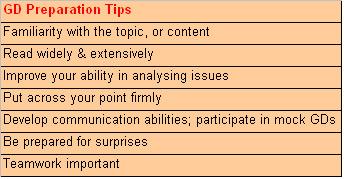http://mystudentrockstars.blogspot.com/
GD preparation tips
An important part of the selection process for almost all management schools comprises the group discussion (GD as aspirants call it) round post the written test that candidates give towards the end of the year. While different institutes assign different weightages to this round, all institutes do consider this a core part of their selection process. The mistake that candidates make while preparing to gain admission in a business school is to leave the preparation for this round far too late.
One must keep in mind that most students prepare for six months for their written examinations. Then why limit the preparation time for the important GD to just a few weeks? After all, it is make or break for potential candidates when they get a call! Hence, the mantra is to start early if you wish to ace your GD round.
Students sometimes forget that the top management schools look for something that goes beyond the ability to just speak fairly well or answer questions.
Preparation strategy
1. Content
One of the most important requisites to speak well during GD is familiarity with the topic, or content. You could be given any topic, ranging from politics to economic issues, sports, social issues, business etc. Keep in mind also that topics are not limited to what is happening only at a national level, but encompass broader global themes. Thus you are expected to be familiar with the important issues playing themselves out on a state, national or global arena.
Another thing is that you may not get only a 'current affairs' topic, but might need to have some knowledge of the historical context and its relevance today. For example, if your topic involves the Kashmir problem, as an example, you might need to demonstrate a certain degree of knowledge regarding the historical context due to which the problem arose, certain leaders and their positions etc.
What helps is that topics very often are chosen from issues that cut across the time spectrum. Issues of terrorism, privatisation and globalisation, economic growth, elections etc are favourites among management institutes and the points that you can make also remain relevant over long periods of time. Topics like 'is the stock market a good indicator of the strength of an economy?' 'What are the root causes of terrorism', 'Have subsidies fulfilled their purpose', 'Has globalisation really helped India', etc seem to be repeated year after year with some variations.
Winning your B-school Group Discussion
Hence the first thing you need to do is to read widely and extensively over a period of time. This will help you in bringing a unique insight/ contribution to the discussion to the table which others may not have thought of. This can only come from a sustained reading effort, over a period of time, and across a breadth of topics.
2. Analysis
The other reason why you need to start preparing early is to improve your ability in analysing issues. The best management schools single out this parameter as being the most important and the one that really helps a student stand out from the rest. When given a topic, do you rush to put forth your opinion or stop and ponder and try to analyse the various facets of the issue at hand?
For example, if given a topic such as "Who is likely to be the next superpower: India or China?", you could first try to analyse as to what are the various parameters that one should consider while deciding which country would be a superpower. These parameters could be economic strength, military prowess, quality of physical and social (education, health) infrastructure in the two countries, influence on other countries in the world etc. It is perhaps these factors that help a country achieve superpower status.
Hence, you have shown a basic ability to go beyond an emotion-driven opinion (in terms of perhaps, which political party you support) to a more analytical approach. This is quite important for the budding manager.
Whenever you read something, ask yourself as to why a certain development took place, whom does it impact and what are the likely future repercussions of that particular development. It could be something like the Tatas developing the Nano. What effect do you expect this to have? How will competitors be impacted? What will they do to cope with this development? Who else will be affected -- maybe the existing second-hand car market?
3. Communication skills & teamwork
This refers to the ability to put across what you know. Remember to put across your point firmly, but not aggressively. Teamwork is also essential-listen to others! You are free to build upon the points put forward to others. Also, let others speak. Do not try to capture all the attention.
The post CAT catch!



